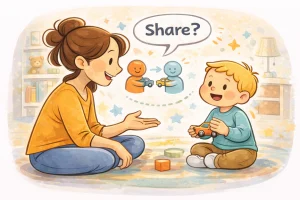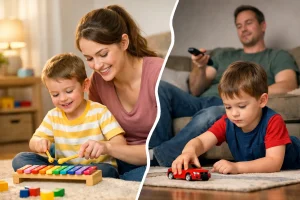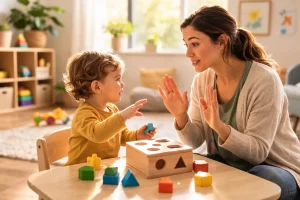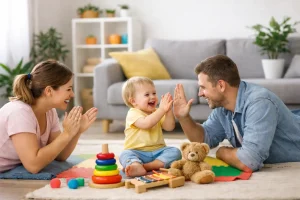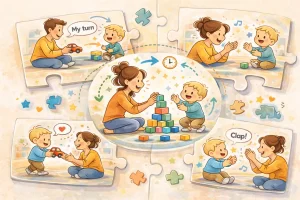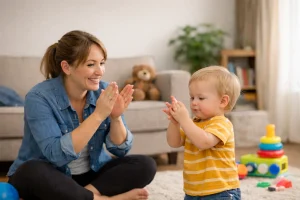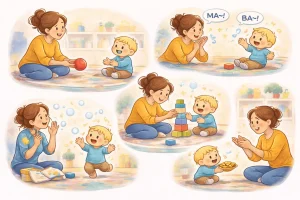What Made Me Seek Speech Therapy for My 1-Year-Old
Last Updated: June 11, 2025
Speech therapy isn’t something most parents think about right away — until the words you’re waiting to hear just don’t come.
By their first birthday, most toddlers say at least one or two words — but what if your child isn’t saying any?
If you’re feeling worried, confused, or even a little guilty about your toddler’s speech development, you’re not alone. Many parents find themselves wondering:
“Is this normal?”
“Should my child be talking more by now?”
“Am I overthinking it?”
These feelings are completely normal. Parenting is filled with joy, but also plenty of moments where we second-guess ourselves. Noticing potential speech delays doesn’t mean something is wrong — it simply shows you’re a caring, observant parent who wants the best for your child.
Every toddler develops at their own pace. Some say their first words early, while others take a little more time to find their voice. But knowing the typical speech milestones — and understanding when speech therapy might help — gives you the clarity and confidence to act early if needed.
Early support can make a lasting difference. Explore our Online Speech Therapy for Kids and take the first step toward confident communication.
Speech and Communication Milestones at 12–18 Months
At around 12 to 18 months, toddlers are growing fast — and that includes how they communicate with the world around them. Speech development at this age isn’t just about saying words; it’s about how your child connects, understands, and responds.
Here are some common speech and communication milestones you might notice:
- Responds to their name: When you call your child, they usually turn to look at you or react in some way.
- Says simple words like “mama” or “dada”: Your toddler might start using familiar words, even if their pronunciation isn’t perfect.
- Points to objects they want or notice: They might point to their bottle, a favorite toy, or something interesting they see.
- Follows simple instructions: Tasks like “come here,” “give me the ball,” or “wave bye-bye” may start making sense to them.
- Waves, claps, or shows simple gestures: Many toddlers enjoy clapping along to songs or waving when someone leaves.
- Shows interest in songs, rhymes, or playful games: Repetitive games like peekaboo, nursery rhymes, and hand motions often capture their attention.
Book your Free Speech Therapy Consultation today — early action makes a big difference.
Signs That Made Me Seek Speech Help
As parents, we know our children better than anyone else. Sometimes it’s not one big moment but small signs that quietly catch our attention. For me — and for many parents — a few early clues made me realize it was time to explore extra support for my 1-year-old’s speech.
Here are the signs that stood out:
| Sign | What I Noticed |
|---|---|
| No words after the first birthday | No simple words like “mama” or “dada,” not even babbling that sounded like words. |
| No pointing or gesturing | My child didn’t point to toys or wave hello or goodbye like other kids their age. |
| No response to name | Calling their name often got no reaction — it felt like they were in their own world. |
| Rare eye contact | Eye contact was brief or often missing during playtime or feeding. |
| Limited use of gestures | Waving, clapping, or showing things to me didn’t happen often. |
| Signs of frustration | When trying to express needs, my child would get upset or have small tantrums instead of using sounds or gestures. |
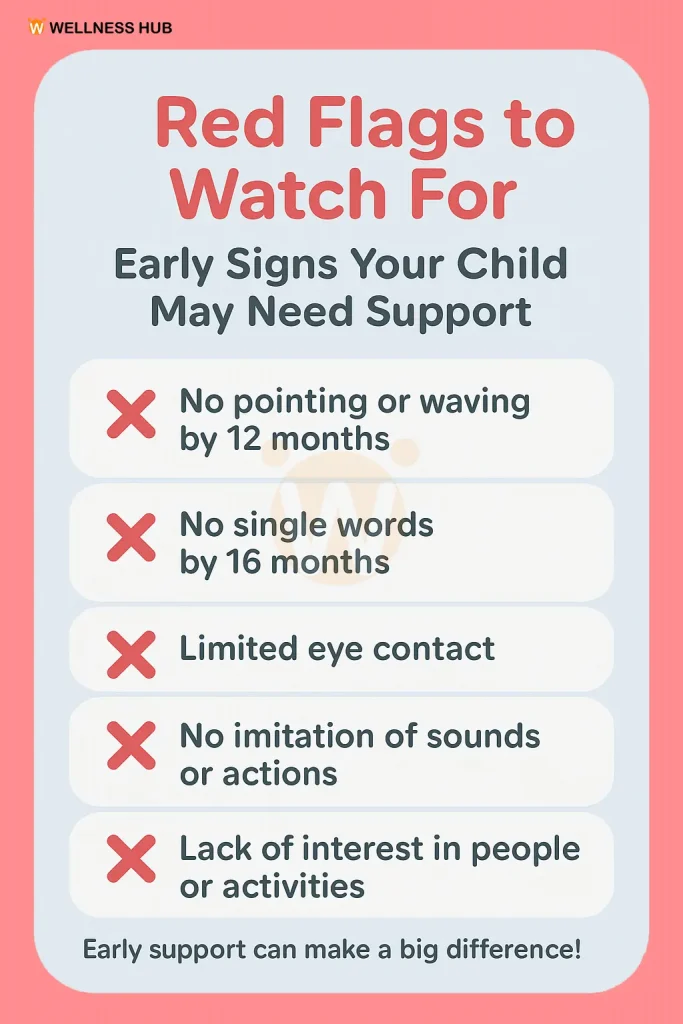
Red Flags That May Indicate a Delay
It’s important to remember: if your child isn’t showing certain skills yet, it doesn’t mean something is wrong — but it might be worth taking a closer look.
Every child develops on their own timeline, but some signs could suggest that a little extra support may be helpful.
Here are some red flags to watch for between 12–18 months:
- No single words by 15–18 months:
Most toddlers start using simple words like “mama,” “dada,” or naming familiar things. A complete absence of words by this age could be a sign to explore further. - No gestures like pointing or waving by 12 months:
Gestures are an important part of early communication. If your child isn’t pointing to ask for things or waving goodbye, it’s a good idea to monitor this closely. - No response to their name by 12 months:
Babies usually recognize and respond to their name by their first birthday. Lack of response could point to either a hearing issue or a speech and language delay. - Rare eye contact:
Eye contact plays a huge role in social communication. If your child avoids or rarely makes eye contact during everyday moments, it may be worth discussing with a professional. - Difficulty engaging with people or toys:
A lack of interest in interactive games, favorite toys, or playing with others might suggest challenges with communication or social connection.
How You Can Support Speech Development at Home
Helping your toddler develop speech doesn’t have to be complicated. In fact, some of the best ways to encourage communication happen naturally through everyday moments.
Small daily efforts can make a big difference — and the best part is, you’re probably already doing more than you realize!
Here are a few simple ways you can support your child’s speech and language growth at home:
- Narrate your daily activities:
Talk to your child about what you’re doing — whether it’s cooking, folding laundry, or taking a walk. Use simple words and short sentences like, “We are washing the dishes,” or “Now we put on your shoes.” - Read picture books together:
Choose colorful, simple books and point to pictures as you say the words. Pause to let your child point, babble, or respond. Even a few minutes a day makes a big impact on vocabulary and listening skills. - Use gestures along with words:
Support your words with gestures — wave when you say “bye-bye,” point when naming objects, or clap when celebrating a success. Gestures make language more visual and easier for young children to understand. - Encourage simple imitation games:
Play games that involve copying actions, sounds, or simple words. Games like “pat-a-cake,” “peekaboo,” or even making silly animal noises together can build early communication skills through fun. - Sing simple nursery rhymes:
Repetition and rhythm make songs powerful language tools. Sing songs like “Twinkle Twinkle Little Star” or “Wheels on the Bus,” and encourage your child to clap or move along.
Every Child is Unique – Early Action Builds Confidence
No two children grow in exactly the same way — and that’s something to celebrate, not stress about. Some toddlers are early chatterboxes, while others take a little more time to find their words. Both paths are part of a normal range of development.
However, when you notice that your child might need a little extra support, taking early action is one of the most positive, empowering steps you can make. Early help isn’t about labeling or rushing; it’s about giving your child the tools they need to thrive at their own pace.
Here’s why early support matters:
| Benefit of Early Action | Why It Helps |
|---|---|
| Builds communication skills sooner | Gives your child more ways to express needs and feelings |
| Boosts confidence | Small successes build trust in themselves |
| Reduces future frustration | Easier communication can lower tantrums and misunderstandings |
| Strengthens parent-child connection | You learn how to support your child in everyday moments |
| Makes learning more fun and natural | Early strategies feel like play, not pressure |
Conclusion
Every child grows in their own way, and needing a little extra help with speech therapy is nothing to worry about. Noticing early signs shows you are a caring, observant parent. At Wellness Hub, we’re here to guide you with personalized online speech therapy and expert support. You don’t have to figure it all out alone — small steps now can build big confidence later. Let’s work together to help your child find their voice and shine bright.
Frequently Asked Questions:
1. Is it normal if my 1-year-old isn’t talking yet?
Yes, it can be normal. Some 1-year-olds are still learning sounds and gestures before using real words. But if you don’t hear any words by 15–18 months, it’s good to check with a speech therapist.
2. When should I worry about my baby’s speech delay?
You should talk to a professional if your baby isn’t using any words by 15–18 months, not pointing or waving by 12 months, or not responding to their name.
3. What are early signs of speech delay in toddlers?
Early signs include no words by 15 months, no gestures like pointing, no response to name, limited eye contact, and getting upset when trying to communicate.
4. How many words should a 1-year-old say?
By 12–18 months, most toddlers say 1–5 simple words like “mama,” “dada,” or “ball.” If your child isn’t using any words, it’s a good idea to talk to a specialist.
5. Can late talking mean autism?
Not always. Some late talkers just need more time. But if your child also avoids eye contact, doesn’t point, or shows little interest in people, it’s good to speak to a developmental expert.
6. How can I help my 1-year-old start talking at home?
You can narrate daily activities, read picture books, use gestures while speaking, sing nursery rhymes, and play imitation games to encourage speech naturally.
7. What’s the difference between a late talker and a speech delay?
A late talker usually catches up by age 2–3 without therapy. A speech delay may include trouble understanding language too, and often needs extra help to improve.
8. How does online speech therapy work for toddlers?
Online speech therapy connects you with a licensed therapist through video sessions. They teach you fun, easy activities to help your child speak and understand better, right from your home.
9. Should I wait or get help early if my child isn’t talking?
Getting help early is best. Early support improves speech skills faster and reduces frustration. Waiting can sometimes make it harder to catch up later.
10. How can Wellness Hub help my child’s speech development?
Wellness Hub offers expert online speech therapy, early screening tools, and 1-on-1 guidance to support your child’s communication milestones in a warm, family-friendly way.
About the Author:
Shilpa Deshpande
Shilpa Deshpande is a skilled speech-language pathologist with over 14 years of experience. Fluent in Kannada, Telugu, Hindi, and English, she specializes in parent counseling, speech sound disorders, fluency assessment, and speech-language evaluations. Shilpa excels at working with children with developmental disorders, offering creative and effective therapy programs. Currently, at Wellness Hub, she holds a BASLP degree and is registered with the RCI. Her patience, ambition, and dedication make her a trusted expert in her field.
Book your Free Consultation Today
Parent/Caregiver Info:
Client’s Details:
* Error Message
